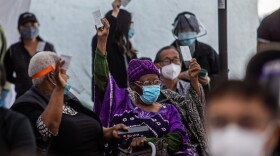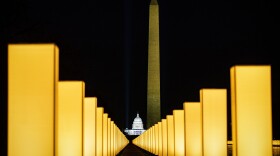The Food and Drug Administration released an analysis of Johnson & Johnson's COVID-19 vaccine Wednesday morning that supports its authorization for emergency use.
On Friday, a panel of advisers to the agency will meet to evaluate the vaccine and make a recommendation about whether it should be given the OK. If the agency goes on to authorize the Johnson & Johnson vaccine, it would be the third, after those made by Pfizer-BioNTech and Moderna, to become available in the U.S.
The Johnson & Johnson vaccine has some advantages. Immunization with the Johnson & Johnson vaccine requires only one shot, unlike the two-shot dosing for the vaccines from Pfizer and Moderna. The Johnson & Johnson vaccine also doesn't require special refrigeration for shipment and storage.
The FDA review noted that an international study of about 40,000 people, half of whom got the vaccine and half of whom got a placebo, found the company's vaccine to be 66% effective overall in preventing moderate to severe COVID-19 disease. The study was conducted in the U.S., Latin America and South Africa.
The agency also said the vaccine has a "favorable safety profile" and that there were "no specific safety concerns identified that would preclude issuance of an EUA." This language mirrors the assessments for vaccines by Moderna and Pfizer-BioNTech, which were authorized in December for emergency use.
The efficacy figures are lower than Pfizer's 95% for preventing COVID-19 disease and 94% for Moderna. Over the course of the pandemic, the coronavirus has begun to change. Variants first seen in South Africa and Brazil, where the Johnson & Johnson vaccine was tested, mutated in ways that help them evade the immune response prompted by vaccines developed against the original form of the virus.
But there are more important measures, Dr. Ashish Jha, dean of the Brown University School of Health told All Things Considered on Monday. "What you care about is hospitalizations and deaths," he said. In the large clinical trial that is the centerpiece of the company's application to the FDA, nobody who received the vaccine required hospitalization or died once the vaccine took full effect (28 days after immunization). "Johnson & Johnson appears to be just as good as Moderna and Pfizer at preventing those," Jha said.
The most common adverse reactions among more than 6,000 study participants who were queried about their experience were injection site pain (49%), headache (39%), fatigue (38%) and muscle pain (33%). These side effects were mostly mild or moderate.
The authorization of Johnson & Johnson's vaccine could eventually help expand the supply of COVID-19 shots for Americans. But its availability won't make a huge difference right away.
In congressional testimony Tuesday, a Johnson & Johnson executive said 4 million doses of vaccine would be available in the U.S. when the FDA grants an emergency use authorization. A total of 20 million doses would be ready by the end of March, he said, and the company would be able to deliver a total of 100 million doses by the end of June.
Copyright 2021 NPR. To see more, visit https://www.npr.org. 9(MDA3MzEzNjc2MDEzMDI2Mzc4OTc4NTFmNg001))











